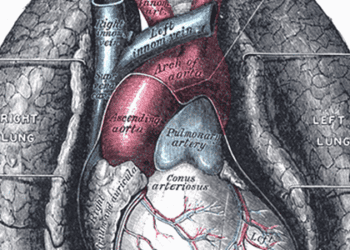Fibulin-3 shows promise as a new biomarker for pleural mesothelioma
Image: CC
Key study points:
- Plasma and pleural effusion levels of Fibulin-3 were significantly higher in patients with mesothelioma compared to people exposed to asbestos and patients with pleural effusions.
- Patients with mesothelioma who went through cytoreductive surgery showed a decrease in Fibulin-3 levels.
Primer: Mesothothelioma is an aggressive tumor of the pleura whose incidence has been on the rise. This is due to the increased exposure of asbestos from construction-related jobs – High-risk occupations include miners, factory workers, carpenters, electricians, etc. It takes about 20 to 50 years for asbestos exposure to manifest as mesothelioma and the lifetime risk for malignant mesothelioma for these workers is approximately 10%. Most people present in an advanced stage of this disease because it is an indolent and relatively asymptomatic cancer. The median survival is 12 months even with the advances of chemotherapy.
Since most people present with advanced cancer, it is important that we develop tests that can identify mesothelioma early in persons exposed to asbestos. However, it is very difficult to clinically diagnose mesothelioma since this disease manifests very non-specific symptoms and requires histopathological examination of pleural tissue to confirm the diagnosis. Proteins such as Soluble Mesothelin-Related Protein (SMRP), Osteopontin, and Megakaryocyte-Potentiating Factor (MPF) have been identified as early biomarkers, but they lack the necessary sensitivity and specificity to be used clinically. The purpose of this study was to evaluate the use of Fibulin-3 as a biomarker to diagnose malignant mesothelioma.
Background reading:
This [case control] study: Plasma and pleural effusion samples from patients diagnosed with mesothelioma were collected from cohorts in Detroit, New York and Toronto (n = 78, n = 64 and n = 48) as well as from a control population of cancer-free, asbestos-exposed persons and patients with benign and malignant pleural effusions not due to mesothelioma.
The samples were analyzed using immunohistochemistry and fibulin-3 ELISA.
The study demonstrated that plasma fibulin-3 levels were significantly higher in patients with mesothelioma compared to those who were exposed to asbestos and those with pleural effusions not caused by cancer. Furthermore, the levels between the two cohorts in Detroit and New York did not show any differences in Fibulin-3 levels (p = 0.63). When these two cohorts were combined and a cutoff of 52.82 ng/mL of Fibulin-3 was established, there was 96.7% sensitivity and 95.3% specificity with an Area Under the Curve (AUC) of 99%. They also showed Fibulin-3 levels decrease (p <0.001) when patients received cytoreductive surgery (n=18). When the authors performed a blinded validation study on the samples from the Toronto hospital, they had a sensitivity of 72.9%, specificity of 88.5% and a AUC of 87% with a cutoff of 28.96 ng/mL.
Effusion fibulin-3 levels showed similar results.
Immunohistochemistry showed that nuclear and cytoplasmic total staining score of fibulin-3 was higher in neoplastic mesothelioma than for non-neoplastic pleura (7.4±0.5 vs. 2.4±0.8, p<0.001).
In sum: This study revealed promise in the use of Fibulin-3 as a biomarker for malignant mesothelioma. This study is particularly important since there is a dearth of useful biomarkers for mesothelioma that shows the high sensitivity and specificity that Fibulin-3 seems to express.
Fibulin-3 is an extracellular glycoprotein encoded by the epidermal growth factor gene. It mediates communication between cells and between the cell and matrix. How Fibulin-3 ties into the development of mesothelioma is unknown. Interestingly, decreased expression of Fibulin-3 levels have been found in lung, prostate, colorectal, breast, nasopharyngeal and hepatocellular carcinomas whereas it is upregulated in pancreatic adenocarcinomas and possibly glioblastomas.
One of the main limitations of this case-control study is that Fibulin-3 levels were compared between groups retrospectively. A prospective study with more longitudinal data would give us a more accurate picture of how useful Fibulin-3 will be clinically in the early detection of mesothelioma. Some of the strengths of this study were the comparison of several cohorts from different cities and the use of multiple methods to compare Fibulin-3 levels. Further research should expand on this data and examine how and why Fibulin-3 levels rise as mesothelioma develops.
Click to read the study in NEJM
By [JC] and [MP]
© 2012 2minutemedicine.com. All rights reserved. No works may be reproduced without written consent from 2minutemedicine.com. DISCLAIMER: Posts are not medical advice and are not intended as such. Please see a healthcare professional if you seek medical advice.




